Truth in America
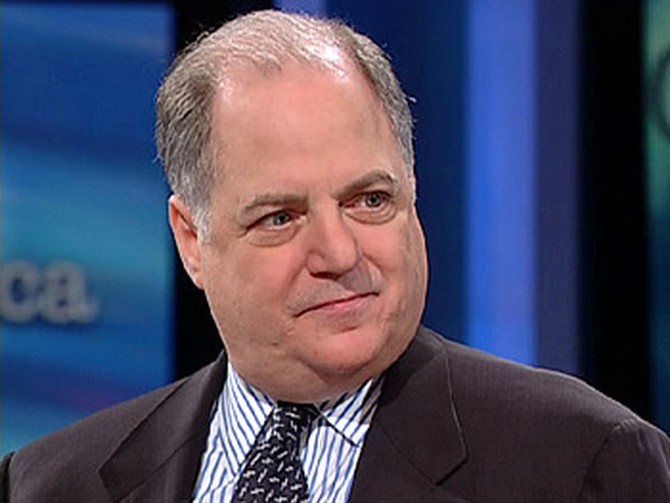
The New York Times columnist Frank Rich's new book, The Greatest Story Ever Sold: The Decline and Fall of Truth, takes a controversial look at the Bush administration, challenging the reasons America went to war with Iraq.
Among the topics covered in the book, Rich asks why the White House suggested al-Qaeda and Saddam Hussein were connected and takes the news media to task for not asking the hard questions after September 11.
"I love America. ... My feeling is that America can only function if there's truth and facts at its core," Frank says. "The whole point of a democracy is to make decisions based on real evidence. And if that well is polluted, we're in trouble."
Frank argues that our 24/7 "infotainment" culture has made America stop thinking critically and become a society that rarely questions what it is told. "I think...there's been a rise in "truthiness," as Stephen Colbert says, and a decline in truth and it's not just about war and politics," Frank says.
Among the topics covered in the book, Rich asks why the White House suggested al-Qaeda and Saddam Hussein were connected and takes the news media to task for not asking the hard questions after September 11.
"I love America. ... My feeling is that America can only function if there's truth and facts at its core," Frank says. "The whole point of a democracy is to make decisions based on real evidence. And if that well is polluted, we're in trouble."
Frank argues that our 24/7 "infotainment" culture has made America stop thinking critically and become a society that rarely questions what it is told. "I think...there's been a rise in "truthiness," as Stephen Colbert says, and a decline in truth and it's not just about war and politics," Frank says.
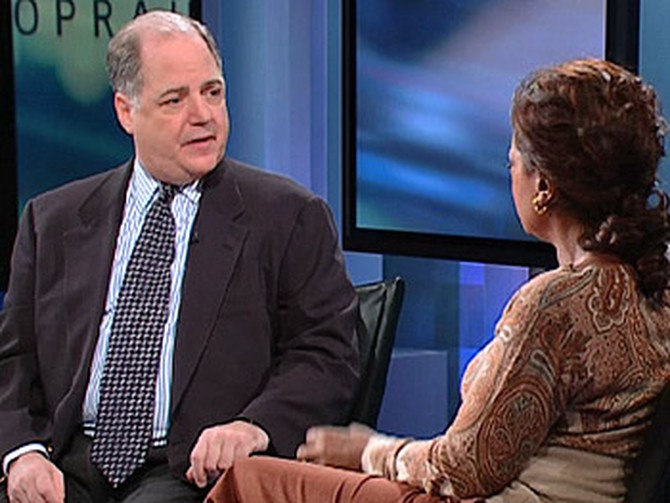
In his book, Frank Rich asks, was the war in Iraq the "greatest story ever sold" to America?
He responds: I think it was sold. ...Whatever one thinks of the war, whether you agree with it or not, it was sold basically on some false premises that involved making us fearful of mushroom clouds coming from Iraq [and] making us believe that Saddam Hussein had something to do with 9/11—and those two story lines were not true. There may have been other reasons for going into Iraq, and maybe even legitimate ones, but not the reasons that we were sold to drum up war fever.
He responds: I think it was sold. ...Whatever one thinks of the war, whether you agree with it or not, it was sold basically on some false premises that involved making us fearful of mushroom clouds coming from Iraq [and] making us believe that Saddam Hussein had something to do with 9/11—and those two story lines were not true. There may have been other reasons for going into Iraq, and maybe even legitimate ones, but not the reasons that we were sold to drum up war fever.
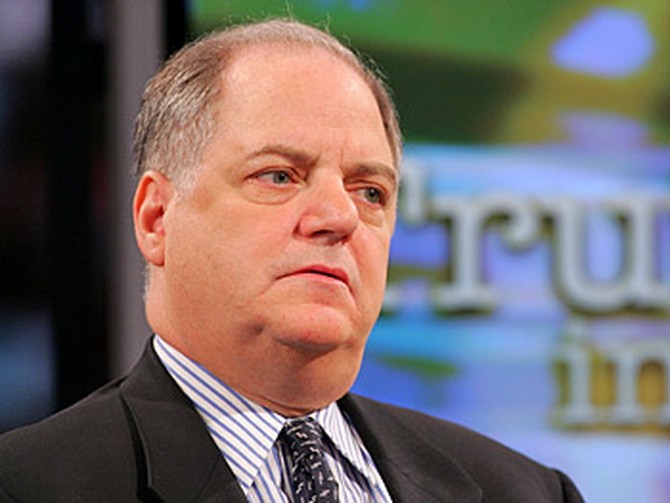
In his book, Frank Rich asks, did the United States have bad intelligence going into the War in Iraq?
He responds: Well, yes and no. ... We did have some bad intelligence, notoriously bad intelligence, and as the administration often says, that same intelligence was seen by their political opposition, the Democrats. It was seen by Europeans. But, we also had good intelligence. We had intelligence that was correct. It was a mixture. And whether it's an amazing coincidence or not, somehow the bad intelligence was used consistently to sell the war—and the good intelligence we've only found out about in the past year or two as the war has come undone. That good intelligence was kept secret orrepressed. ...
Oprah: So you say in the book that the biggest misconception is that a lot of Americans at the time believed that Saddam Hussein had something to do with 9/11.
Frank: Right. But it's interesting. Right after 9/11 polls showed very few Americans thought Saddam Hussein had anything to do with it. They thought it was about Osama bin Laden, which it was, and al-Qaeda. But by constantly mentioning 9/11 and Iraq in the same breath, in the same sentence, in the run up to war, it's almost like a mind melding...It creates this link. And so polls showed in that period more and more people started to believe there was a connection—to the point where when we went to war half of America thought the hijackers of 9/11 were Iraqis. None of the 9/11 hijackers were Iraqis.
He responds: Well, yes and no. ... We did have some bad intelligence, notoriously bad intelligence, and as the administration often says, that same intelligence was seen by their political opposition, the Democrats. It was seen by Europeans. But, we also had good intelligence. We had intelligence that was correct. It was a mixture. And whether it's an amazing coincidence or not, somehow the bad intelligence was used consistently to sell the war—and the good intelligence we've only found out about in the past year or two as the war has come undone. That good intelligence was kept secret or
Oprah: So you say in the book that the biggest misconception is that a lot of Americans at the time believed that Saddam Hussein had something to do with 9/11.
Frank: Right. But it's interesting. Right after 9/11 polls showed very few Americans thought Saddam Hussein had anything to do with it. They thought it was about Osama bin Laden, which it was, and al-Qaeda. But by constantly mentioning 9/11 and Iraq in the same breath, in the same sentence, in the run up to war, it's almost like a mind melding...It creates this link. And so polls showed in that period more and more people started to believe there was a connection—to the point where when we went to war half of America thought the hijackers of 9/11 were Iraqis. None of the 9/11 hijackers were Iraqis.
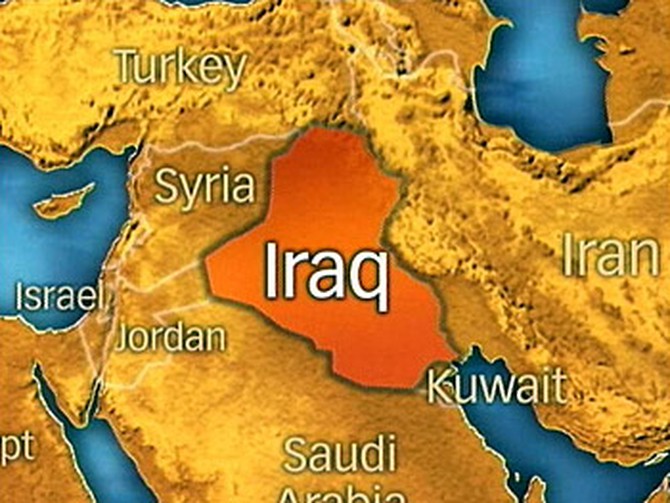
In his book Frank Rich asks, has there ever been a direct link between al-Qaeda and Iraq?
He responds: No. No direct operational link, and that's been said by the 9/11 Commission itself. ...
In 2003, Colin Powell made his case for war at the United Nations and presented evidence of weapons of mass destruction in the country that later proved false.
Oprah: What impact do you think that had on the nation?
Frank: I think it had dramatic impact because he's a very credible, honorable guy, and it was very graphic. It was made for television. He had a vial with anthrax in it and photos.
Oprah: Yeah. I certainly believed Colin Powell.
Frank: I did, too...a lot of people did.
Oprah: Do you now think that his presentation was not truthful?
Frank: [Colin Powell] now says it's a blot on his record. ... He was fed this intelligence.
He responds: No. No direct operational link, and that's been said by the 9/11 Commission itself. ...
In 2003, Colin Powell made his case for war at the United Nations and presented evidence of weapons of mass destruction in the country that later proved false.
Oprah: What impact do you think that had on the nation?
Frank: I think it had dramatic impact because he's a very credible, honorable guy, and it was very graphic. It was made for television. He had a vial with anthrax in it and photos.
Oprah: Yeah. I certainly believed Colin Powell.
Frank: I did, too...a lot of people did.
Oprah: Do you now think that his presentation was not truthful?
Frank: [Colin Powell] now says it's a blot on his record. ... He was fed this intelligence.
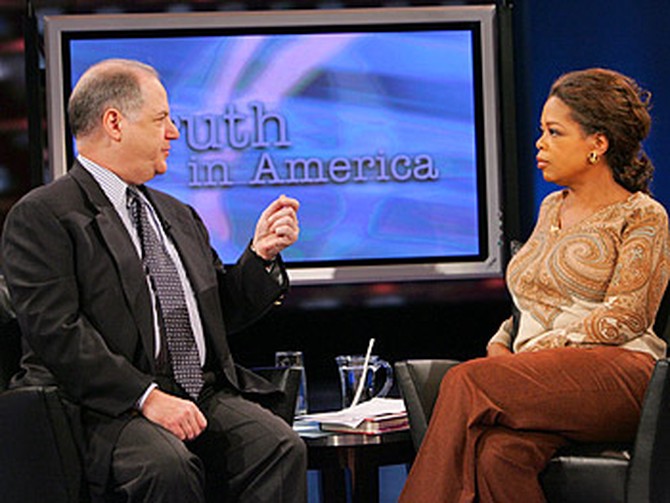
In his book, Frank Rich asks, how did the media play a role in going to war in Iraq?
He responds: I think the media, after 9/11...we're human. Journalists are human. We were shocked and horrified and we rallied around our president. Ninety percent of the country supported the president after 9/11, and we had a human reaction. ... Then it's 2002, into 2002, when they started rolling out this evidence of supposed weapons of mass destruction. We should have been more skeptical. It lasted too long for the media. ...
Oprah: You say ironically that it was The Daily Show, Jon Stewart's fake news program on Comedy Central, that really consistently asked the tough questions. ... So what does that tell us?
Frank: ... I think people somehow knew they were being handed a line and were desperate to find some source of truth even if it came in the form of jokes and comedy, which it did.
He responds: I think the media, after 9/11...we're human. Journalists are human. We were shocked and horrified and we rallied around our president. Ninety percent of the country supported the president after 9/11, and we had a human reaction. ... Then it's 2002, into 2002, when they started rolling out this evidence of supposed weapons of mass destruction. We should have been more skeptical. It lasted too long for the media. ...
Oprah: You say ironically that it was The Daily Show, Jon Stewart's fake news program on Comedy Central, that really consistently asked the tough questions. ... So what does that tell us?
Frank: ... I think people somehow knew they were being handed a line and were desperate to find some source of truth even if it came in the form of jokes and comedy, which it did.
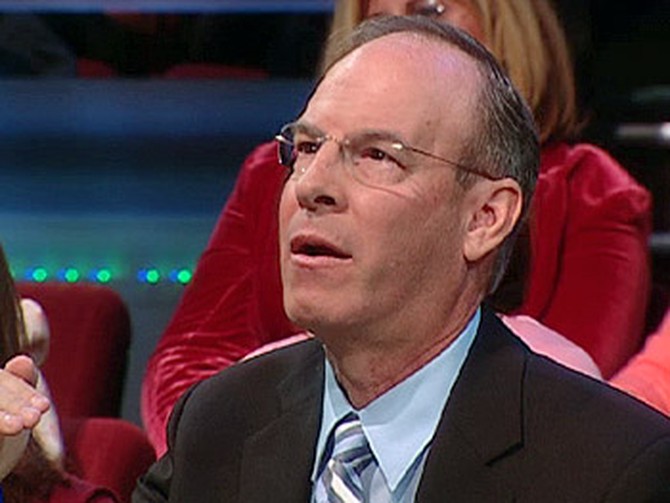
In his book, Frank Rich asks, is the news media's agenda more concerned with the truth behind important topics or with ratings?
He responds: Well, particularly television news, which is how most Americans get their news, it's ratings. It's a race to the bottom. What sells most. John Mark Karr sells more than a deliberate investigation of the war in Iraq. ...
Dr. Roy Peter Clark, Poynter Institute Senior Scholar: I think what's most interesting about sort of what's happened is that the 24-hour news cycle creates this appetite for news and content. And the news and content that gets the most attraction is the stuff that's...very interesting but it's not ultimately important. And what the journalist's job is is to make important things interesting. ... We depend upon journalists to go out and not just spout things, but to check things out.
He responds: Well, particularly television news, which is how most Americans get their news, it's ratings. It's a race to the bottom. What sells most. John Mark Karr sells more than a deliberate investigation of the war in Iraq. ...
Dr. Roy Peter Clark, Poynter Institute Senior Scholar: I think what's most interesting about sort of what's happened is that the 24-hour news cycle creates this appetite for news and content. And the news and content that gets the most attraction is the stuff that's...very interesting but it's not ultimately important. And what the journalist's job is is to make important things interesting. ... We depend upon journalists to go out and not just spout things, but to check things out.
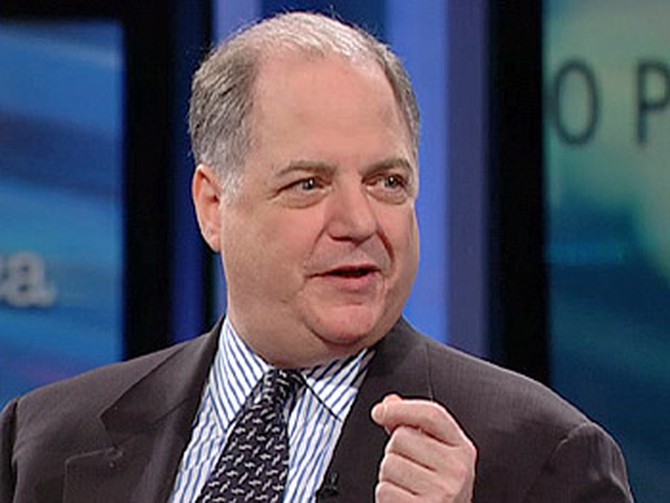
In his book, Frank Rich asks, are we being told the truth about what is currently going on in Iraq?
He responds: The problem in Iraq is that it is so unsafe. A very brave war correspondent for the Times said two weeks ago that 98 percent of the country—and in Baghdad in particular—reporters can't go to because it's just too dangerous. More reporters have been killed in this war than any modern war. At a certain point, a place like the New York Times or ABC News has to say, you cannot get killed for the story. That in itself tells us something that the country is so unsafe that we can't cover it. We rely on Iraqis to cover it and the Iraqis often are so frightened of being seen working for Americans that they won't reveal their identities to their own families as journalists.
Oprah: What do you think we're not being told, then?
Frank: I think what we're not being told is what's coming out anyway in secret reports from the Pentagon and CIA. We're near a civil war [in Iraq], if not at a civil war. A lot of it is not about insurgents and terrorists—a lot of it is, but a lot of it is about us being in the middle of a crossfire of a religious war that has nothing to do with why we went in there. And what we're also not seeing is that much of the reconstruction—the $22 billion that we spent to rebuild schools and hospitals—has been lost on waste, corruption or simply because it's too unsafe to build things.
He responds: The problem in Iraq is that it is so unsafe. A very brave war correspondent for the Times said two weeks ago that 98 percent of the country—and in Baghdad in particular—reporters can't go to because it's just too dangerous. More reporters have been killed in this war than any modern war. At a certain point, a place like the New York Times or ABC News has to say, you cannot get killed for the story. That in itself tells us something that the country is so unsafe that we can't cover it. We rely on Iraqis to cover it and the Iraqis often are so frightened of being seen working for Americans that they won't reveal their identities to their own families as journalists.
Oprah: What do you think we're not being told, then?
Frank: I think what we're not being told is what's coming out anyway in secret reports from the Pentagon and CIA. We're near a civil war [in Iraq], if not at a civil war. A lot of it is not about insurgents and terrorists—a lot of it is, but a lot of it is about us being in the middle of a crossfire of a religious war that has nothing to do with why we went in there. And what we're also not seeing is that much of the reconstruction—the $22 billion that we spent to rebuild schools and hospitals—has been lost on waste, corruption or simply because it's too unsafe to build things.
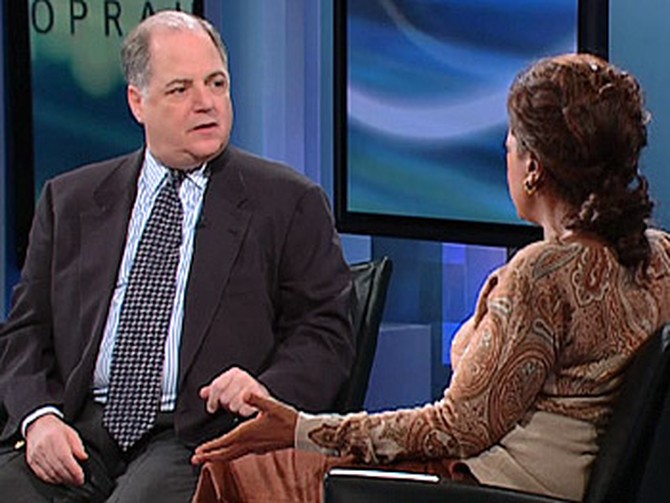
In his book, Frank Rich asks, since the war in Iraq, has America become more polarized?
He responds: Yes, that's what pollsters say, that it's even worse than during the Vietnam War. But interestingly, it's a civil civil war. It's not where people are being killed on campuses as happened in the '60s. It's a very loud debate and I think that's a very good thing, particularly in an election season. We should debate these things.
He responds: Yes, that's what pollsters say, that it's even worse than during the Vietnam War. But interestingly, it's a civil civil war. It's not where people are being killed on campuses as happened in the '60s. It's a very loud debate and I think that's a very good thing, particularly in an election season. We should debate these things.
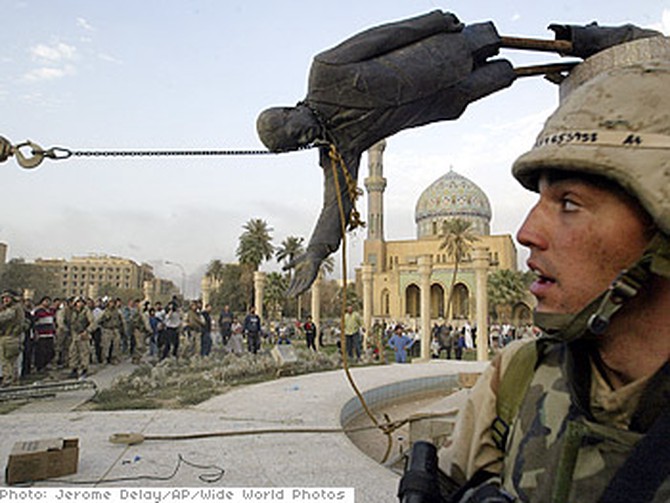
Days after the invasion of Iraq, viewers around the world witnessed one of the most striking images during the war. A large assembly of Iraqi men banded together to pull down a statue of their long-time dictator, Saddam Hussein.
In his book, Frank Rich asks, what didn't the cameras capture?
He responds: It was a "fictional reality" because it was constantly said on television it was like the falling of the Berlin wall. But the Americans didn't help the fall of the Berlin wall— the Berliners did it themselves. This was actually a fairly small organized crowd with American help that took down one statue. And the way it was framed by TV, it often looked like it was making true what Vice President Cheney had said— that we were being greeted as liberators. But actually it was a small group of people and indicative of nothing. Even while the statue was falling—which is a good thing, to knock down a statue of Saddam—elsewhere, not seen on TV, there were signs of the insurgency and unrest in Baghdad that would later haunt us.
In his book, Frank Rich asks, what didn't the cameras capture?
He responds: It was a "fictional reality" because it was constantly said on television it was like the falling of the Berlin wall. But the Americans didn't help the fall of the Berlin wall— the Berliners did it themselves. This was actually a fairly small organized crowd with American help that took down one statue. And the way it was framed by TV, it often looked like it was making true what Vice President Cheney had said— that we were being greeted as liberators. But actually it was a small group of people and indicative of nothing. Even while the statue was falling—which is a good thing, to knock down a statue of Saddam—elsewhere, not seen on TV, there were signs of the insurgency and unrest in Baghdad that would later haunt us.
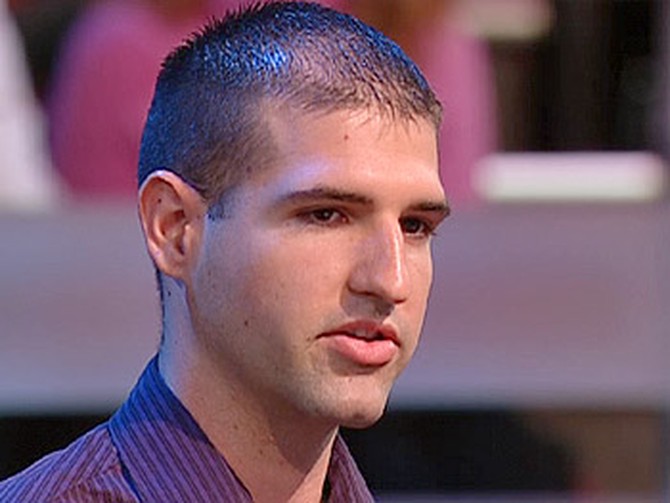
What do soldiers who were in Iraq think?
Cameron Maasen, a soldier who was in the audience, shares his experience: I was actually over there and ... we had Iraqis come on the post that I was at every day and the little bit of English that they could speak, they were just praising us, you know. And you don't see about that. You don't hear about that. [Instead, the news would show] a video of Marines shooting around a corner. You'd see that same shot 10, 12 times within two hours. And you never see the schools that we're building and the people who we're helping and all the hospitals we were helping build.
Cameron Maasen, a soldier who was in the audience, shares his experience: I was actually over there and ... we had Iraqis come on the post that I was at every day and the little bit of English that they could speak, they were just praising us, you know. And you don't see about that. You don't hear about that. [Instead, the news would show] a video of Marines shooting around a corner. You'd see that same shot 10, 12 times within two hours. And you never see the schools that we're building and the people who we're helping and all the hospitals we were helping build.
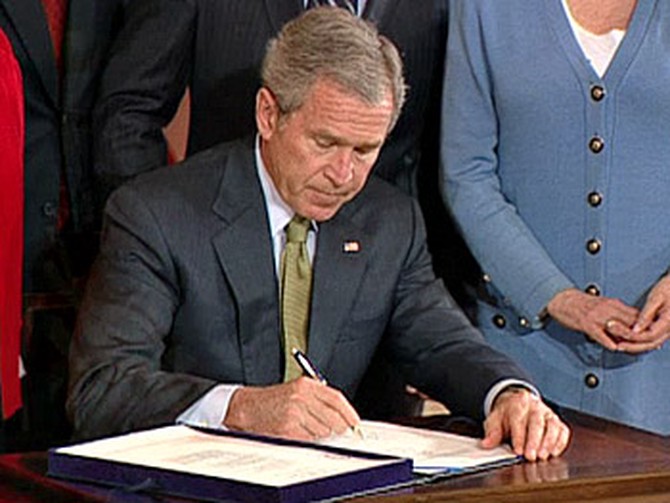
In his book, Frank Rich asks, did we go to Iraq to make up for what happened when George W. Bush's father was president?
He responds: This is a very interesting question and is something I go into deeply in my book. And we don't really yet know the answer. ...
What we know is that right after 9/11 some people in the administration, who had long wanted to go into Iraq even before 9/11, presented that idea. And we know that the President initially rejected it. In fact, he said in one of Bob Woodward's books, we want to keep our focus on al-Qaeda and not get distracted. Something changed in the following months.
Oprah: What I got from the conclusion in your book, you're not really sure why.
Frank: No one's sure. Someone who worked in the State Department with Colin Powell says he'll go to his grave not knowing why. We know all these reasons that are possible: finishing the job from '91 from his father, oil, remaking the Middle East, building democracy. Those reasons have been stated since; but before the war, they were not. If this was important for us to go into Iraq, tell us the real reasons and let's have a debate about it with our elected representatives, rather than have to trump up "mushroom clouds" to sell the product.
He responds: This is a very interesting question and is something I go into deeply in my book. And we don't really yet know the answer. ...
What we know is that right after 9/11 some people in the administration, who had long wanted to go into Iraq even before 9/11, presented that idea. And we know that the President initially rejected it. In fact, he said in one of Bob Woodward's books, we want to keep our focus on al-Qaeda and not get distracted. Something changed in the following months.
Oprah: What I got from the conclusion in your book, you're not really sure why.
Frank: No one's sure. Someone who worked in the State Department with Colin Powell says he'll go to his grave not knowing why. We know all these reasons that are possible: finishing the job from '91 from his father, oil, remaking the Middle East, building democracy. Those reasons have been stated since; but before the war, they were not. If this was important for us to go into Iraq, tell us the real reasons and let's have a debate about it with our elected representatives, rather than have to trump up "mushroom clouds" to sell the product.
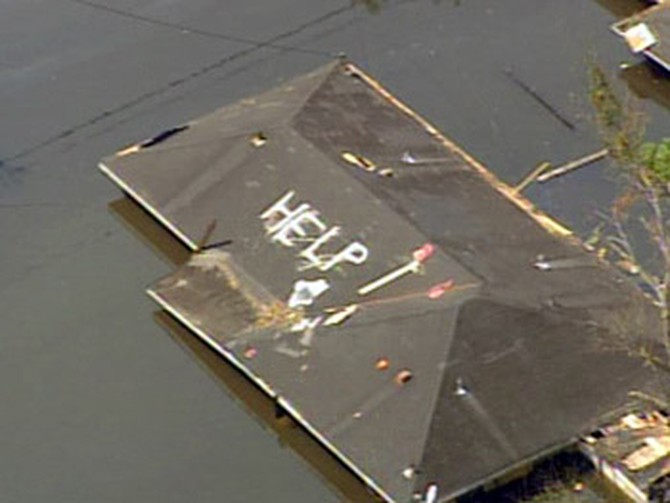
In his book Frank Rich asks, what did Hurricane Katrina teach us?
He responds: Hurricane Katrina to me was in some ways the end of the story I wanted to tell because that's when I felt this manipulation of the truth came back to haunt this particular White House. When the devastation of Katrina happened, Americans saw, with their own eyes, suffering fellow Americans begging for help. And Homeland Security and elsewhere said, "It's all fine." Or, "We don't even know about it."
Oprah: Was that lies or they just didn't know?
Frank: It was a replay of what had happened in the war in Iraq. They're telling us good news all the time, the government is, when there's bad news happening. It was harder to see in Iraq, in part because it's so dangerous. Here it was in New Orleans, it was on the Gulf Coast, it was Americans. And the President is saying to someone, "[Michael Brown] is doing a heck of a job," when he was obviously doing a terrible job and every American knew it.
Oprah: But I didn't think that was lying. I thought he just had not been informed. There's a difference.
Frank: You make a very good point. You can also say that, like the weapons of mass destruction [before] going into Iraq, we know they were informed. But you can ignore certain information and present other information. How could [former FEMA Director Michael Brown and Secretary of Homeland Security Michael Chertoff] not be informed when something's happening live on television?
He responds: Hurricane Katrina to me was in some ways the end of the story I wanted to tell because that's when I felt this manipulation of the truth came back to haunt this particular White House. When the devastation of Katrina happened, Americans saw, with their own eyes, suffering fellow Americans begging for help. And Homeland Security and elsewhere said, "It's all fine." Or, "We don't even know about it."
Oprah: Was that lies or they just didn't know?
Frank: It was a replay of what had happened in the war in Iraq. They're telling us good news all the time, the government is, when there's bad news happening. It was harder to see in Iraq, in part because it's so dangerous. Here it was in New Orleans, it was on the Gulf Coast, it was Americans. And the President is saying to someone, "[Michael Brown] is doing a heck of a job," when he was obviously doing a terrible job and every American knew it.
Oprah: But I didn't think that was lying. I thought he just had not been informed. There's a difference.
Frank: You make a very good point. You can also say that, like the weapons of mass destruction [before] going into Iraq, we know they were informed. But you can ignore certain information and present other information. How could [former FEMA Director Michael Brown and Secretary of Homeland Security Michael Chertoff] not be informed when something's happening live on television?
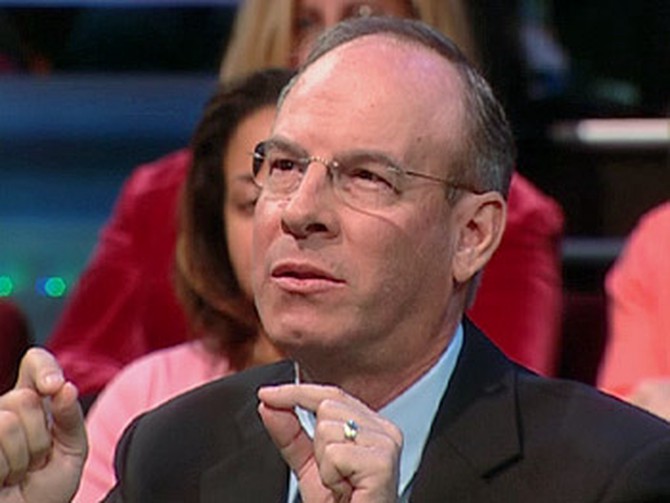
Dr. Roy Peter Clark asks, how can we get back to critical thinking?
He responds: There's truth, there's "truthiness," and what we're describing now is "truthy-mess." There's so much information available out there that it's hard to know what to believe. We have to figure out what the world looks like from all these different points of view. This requires skepticism, which is a great democratic virtue, but not cynicism.
Oprah: It boils down to us critically thinking and being more skeptical about what we are told in all areas.
Dr. Clark: Pay attention to who the speaker is. Be suspicious of anybody who ignores your argument in terms of disloyalty. Be aware of anybody who tries to persuade you by slogan alone. Pay attention to people who want to have a conversation with you.
Start recognizing the truth in government and media with seven ways to start thinking critically.
He responds: There's truth, there's "truthiness," and what we're describing now is "truthy-mess." There's so much information available out there that it's hard to know what to believe. We have to figure out what the world looks like from all these different points of view. This requires skepticism, which is a great democratic virtue, but not cynicism.
Oprah: It boils down to us critically thinking and being more skeptical about what we are told in all areas.
Dr. Clark: Pay attention to who the speaker is. Be suspicious of anybody who ignores your argument in terms of disloyalty. Be aware of anybody who tries to persuade you by slogan alone. Pay attention to people who want to have a conversation with you.
Start recognizing the truth in government and media with seven ways to start thinking critically.
Published 10/12/2006

